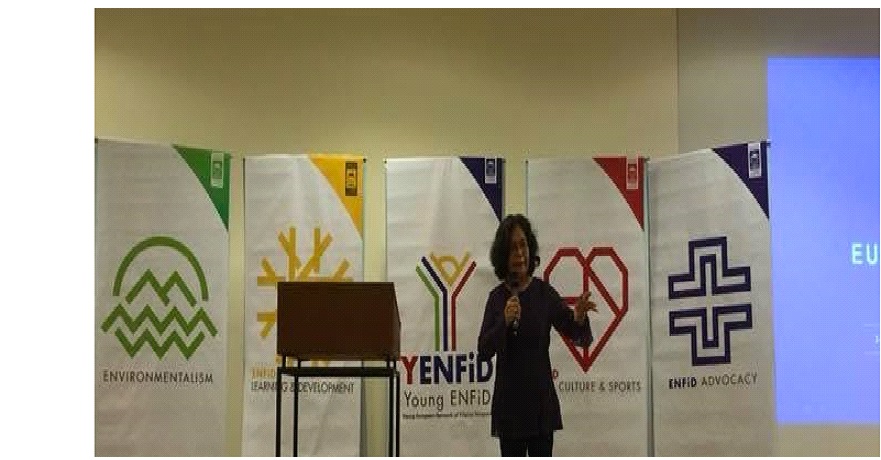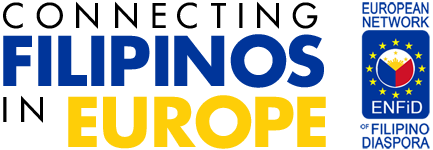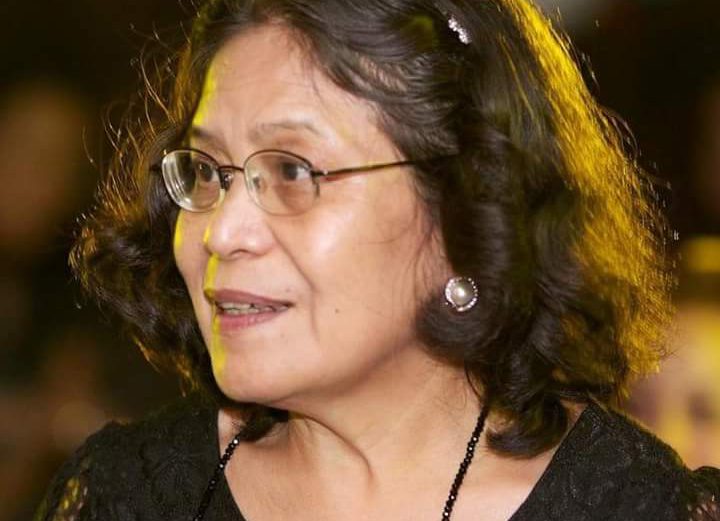WHO’S WHO in Euro-Pinoy Community
This section features Filipino living in Europe who has been an inspiration to their fellowmen through the works that they do and their contribution to the political, economic, scientific, technical, social and artistic life in Europe or in the Philippines. I am privileged to interview one of the most experienced advocate of social development.


Ms. Leila Rispens-Noel, is from Davao del Sur, married to her Dutch husband, Mr. Wim Rispens and a mother of two sons. She came to Netherlands in October 1979 to obtain a Diploma in Rural and Agricultural Planning. From then on, she devoted her time in migration and development works. She is the founder of Wimler Foundation a non-profit, non-government organization based in the Philippines and HongKong. A few years ago she and her husband has reintegrated back in the Philippines.
Below is an extract from the interview.
Tell us about your organization Wimler? How did it start? What motivated you to establish it?
I officially registered WIMLER Philippines as a non-governmental, non-profit organization in 2006 in Davao City. However, many years before that I have been actively supporting various projects in my hometown on my personal capacity.
My main motivation to start supporting small projects is my desire to “give back”. I came from a poor family.
I finished my college through the help of a good Samaritan. I was ecstatic when I received my college diploma that I promised myself: “If ever I have the means in the future, I want to give back”.
My Dutch family agreed that we start with a couple of children. It started as a private initiative. Later, more and more friends and families like to support my advocacy.
WIMLER evolves. While we focused on “Send a Child to School”, I was also getting more and more involved in migration and development-related issues in the Netherlands not only among Filipinos but also with other nationalities, African, Asian, and South American diasporas. My advocacy is to empower diasporas so they can be active agents and partners for development in their host and home countries.
Since its inception in 2006, WIMLER Philippines was able to encourage the setting up of WIMLER HK, WIMLER USA, and WIMLER Dubai. These are support groups which conduct fund raising campaign to support children in the Philippines. Perhaps, in 2018 we will have WIMLER Germany. We have individual donors from different countries.
To sustain the support of our stakeholders, we make regular financial and accomplishment report so they know where their donations went.
What are the most important decisions you make as a leader
It is during critical times of the organization that leadership is needed. Fortunately, I am not always alone in making important decisions. We have a Board to discuss and solve issues. For me, the most crucial decision I made is to start something with big plans and the only thing that you have is a dream, nothing more. Establishing credibility of the organization is very important.
Decision-making is not hard to do when you know what you are doing is for the good of the people whom you serve. You do not do it for yourself but for others.
Which is the most important to your organization – mission, core values or vision?
All of them are important and I would add, specific objectives and clear activities are needed, too. A clear mission, vision and core values are important in any organization because this is your roadmap to guide you where you want to go. However, vision and mission no matter how inspiring they are but not translated into coherent, concrete and achievable actions, they are useless. In short, you must be able to operationalize your vision and mission.
To have an effective organization, all these elements must be present: mission, vision, core values, specific objectives, and clear activities and projected outcomes. I have learned how to apply strategic planning in what I do, small and large projects. This is a very useful tool if applied properly.
How do you communicate these to your colleagues?
In the case of WIMLER, the Board of Directors must understand the vision, mission, etc. of the organization although I do not expect that everybody would adopt them all at the same level of passion and engagement as I do. It is not fair. We have core values, but each person has diverse ways of translating them into action and how they practice them in their day to day lives.
A good example is the present situation of our country. I would admit that some of the people I work with have different political orientations as mine. I cannot change that, but I am guided by the value of respecting other people’s opinion and ideas, so I exercise maximum tolerance. I cannot impose on everyone I work with that they must follow my own values. The most I can do is to make it clear on everyone what I stand for and if we can agree that we continue to work together, that is fine.
In an organization, it is ideal that you conduct strategic planning and regular evaluation so that everybody in the group are in the same line. This is not easy if you work with volunteers and colleagues living in different countries. Fortunately, our means of communications have improved considerably: you can skype, send email, chat in real time etc. I organize events in Hong Kong for example without necessary being there.
What is the biggest challenge leaders have today?
From the servant-leadership lens, the biggest challenge of the leaders in the present Philippine context is how to deal with the diverse opinions and values of people and eventually rally people to work together for a common goal. How to listen to and commit to the growth of people, heal, and build communities of people who respect and care for each other so that collectively, we can effect some positive changes in the society.
There is a crisis of leadership from all levels; a leadership vacuum which hinders forging unity. We seem to not to be able to identify what kind of leaders we want to have, and what values we must emulate. We are divided as well as regards to the means how to solve social problems. Some people like a strong leader but how strong is strong? For example, others think that it is ok to kill drug addicts since they are criminals and menace of the society. If they are gone, people would feel safe. They believe that killing addicts is a necessity, a collateral damage, in the conduct of war on drugs. On the other hand, others believe that rehabilitation and addressing the root causes of drug addiction are the best approach and killing is not acceptable in a humane and democratic society.
But as I said, this is in political sphere which is very complex.
Who/what influenced your leadership style?
I am influenced by different leaders and thoughts in various stages of my life. I was very young when I got involved in activism. Our country was under Martial Law. I came across a passage in the Bible, Matthew 10:37.
“He who loves father or mother more than Me is not worthy of Me; and he who loves son or daughter more than Me is not worthy of Me.”
I had sleepless nights, but I finally decided to leave my home and family and worked with people.
In terms of method of work, I adopted Paolo Freire’s Pedagogy of the Oppressed”. The passage below inspired me a lot and understand how it is to work with people:
“Leaders who do not act dialogically, but insist on imposing their decisions, do not organize the people–they manipulate them. They do not liberate, nor are they liberated: they oppress.”
At present I am actively promoting social entrepreneurship. Time change, so with people. The bottom line is to know who do you serve and which values and principles you stand for.
People would recognize you as a leader by your actions and examples. Perhaps, my ideal leader is not really someone who is not political and popular but someone who can unleash and sustain my inner strength. The values you promote, and your lifestyle must go hand in hand to be a credible leader.
I think it is important to mention passion. To be passionate always in what you do and believe in without imposing them on others.
The people I work with influence me a lot. I hear stories from the people Wimler work with: domestic helpers, poor children we send to school, the indigenous people, small women entrepreneurs. I hear their daily struggles and celebrate each time they make small progress. This keeps me going. I am motivated if I see people who share their skills, talents and resources to help the least advantaged of the society. I am not alone.
I also learned the concept of stewardship, the careful and responsible planning and managing of people or things.
What advise can you give to others who are in a leadership position?
To take care of and respect the people they work with through capacity and empowerment program. Provide them with skills and let them handle various tasks. In this way, they develop self-confidence. Empowered colleagues can immensely contribute to the organization and lighten the workload. A leader inspires people to deliver. That leaders only guide and help people find solutions for their problems. I have never thought that I can solve other people’s problem. This is also the reason why I am always open, working with like-minded people and organizations so we can create synergy.
Do not promise anything which you cannot fulfill. Do not encourage false expectations. Explain to them the things that need to be done and involve them in the process in achieving the goals and what it takes to achieve them. Be honest with our own limitations even if you are a leader.
A leader must be visionary, one who can inspire others through their own action, lifestyle, and the way they deal with other people from all walks of life. A leader is someone who respect others. At the same time, a leader must be critical without being overbearing. One who constantly looks for solution and does not dwell on problems. I like positive—oriented people.
If they commit mistakes, I do point out to them the consequences of that action and hopefully they will appreciate it and try to do better. Despite what seems a soft leadership approach I practice, I am tough inside and if needed, I play tough. I do not settle with “it is good enough”. I want the best output.
A leader takes responsibility. It is hard but we need humility to accept things when we are wrong.
The best way to inspire people is to allow them to tap their own creativity, let them do things the way they want it but not forgetting to advice and guide them when needed. To allow people to shine and have a sense of ownership of what we are doing instead of the leader enjoying the spotlight I think is more enduring.
Lastly, I believe peace can be achieved without violence, and forms of violence. Without peace, there is no development.
Please find more info about Wimler:
http://wimler.org/about/history/
An article about Ms. Rispens- Noel and her work: https://mm-gold.azureedge.net/Articles/bikash_barua/Leilas_Interview.pdf
Photo credits:
Manay Tess
Dennis Mana-ay

